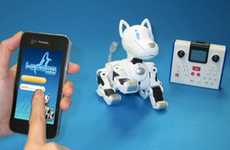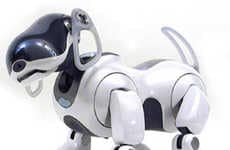
The iCub DeeChee Develops Vocabulary by Interacting With Humans
Sarah Moore — June 27, 2012 — Tech
References: itv & fastcompany
While it does not clean your house or make you dinner, the iCub DeeChee does something a little bit creepier -- talk to you.
Like something out of a science fiction film, the humanoid robot can learn sounds and words by interacting with humans around it. Not only that, but the robot can also pick up on body language cues and mimic appropriate gestural responses like a head shake or a hand movement to accompany the words it uses.
Developed by researchers at the University of Hertfordshire, the robot has been programmed with 40,000 syllables commonly used in the English language. By listening to the syllables that are most often said in a conversation the robot then mimics the sounds used in conjunction with certain actions or when making associations between objects.
Like something out of a science fiction film, the humanoid robot can learn sounds and words by interacting with humans around it. Not only that, but the robot can also pick up on body language cues and mimic appropriate gestural responses like a head shake or a hand movement to accompany the words it uses.
Developed by researchers at the University of Hertfordshire, the robot has been programmed with 40,000 syllables commonly used in the English language. By listening to the syllables that are most often said in a conversation the robot then mimics the sounds used in conjunction with certain actions or when making associations between objects.
Trend Themes
1. Language Learning Robots - There are opportunities for creating more advanced language learning robots that can mimic human-like language ability.
2. Humanoid Robots - Developers can focus on making more sophisticated robots that can interact with humans like the iCub DeeChee.
3. Artificial Intelligence in Robotics - By implementing AI into robots like the iCub DeeChee, the robots will be able to learn faster and expand their abilities.
Industry Implications
1. Robotics - The ability to create robots that can learn from humans will initiate a new wave of advancement and innovation in the robotics industry.
2. Artificial Intelligence - There will be more opportunities for AI professionals to expand their expertise into the field of robotics and contribute to the development of new technologies.
3. Education - Language learning robots can change the landscape of education by providing new tools and resources for language learners.
1.4
Score
Popularity
Activity
Freshness















